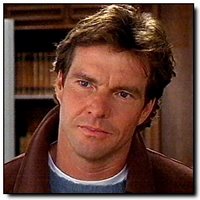Frequency

Tonight I watched a movie on TV I hadn't seen before ... Frequency ... from 2000, starring Jim Caviezel and Dennis Quaid. Normally I wouldn't post about every odd movie I watch on TV, but this one especially touched me because of my father.

- Caviezel in The Passion of the Christ
The movie begins by showing us Jim Caviezel's character, John Sullivan, a 36 year old homocide detective, whose life has been deformed by the death of his firefighter father, Frank (Dennis Quaid), thirty years earlier, as he tried to rescue someone from a burning warehouse.

- Quaid
One night, John (Caviezel) takes out his father's old ham radio and, due to some weird combination of sun spot activity and the Aurora Borealis, he is able to cannect with and speak to his father, on the same radio, in 1969, the day before he is killed ... John convinces Frank to alter his actions at the warehouse and saves his life. The rest of the movie involves the solving of a series of murders and the many unpredictable results of time travel.
As Roger Ebert writes in his review ...
The paradox of time travel is familiar. If you could travel back in time to change the past in order to change the future, you would already have done so, and therefore the changes would have resulted in the present that you now occupy. Of course the latest theories of quantum physics speculate that time may be a malleable dimension, and that countless new universes are splitting off from countless old ones all the time--we can't see them because we're always on the train, not in the station, and the view out the window is of this and this and this, not that and that.
But "Frequency" is not about physics, and the heroes are as baffled as we are by the paradoxes they get involved in. Consider a scene where the father uses a soldering iron to burn into a desk the message: I'm still here, Chief. His son sees the letters literally appearing in 1999 as they are written in 1969. How can this be? If they were written in 1969, wouldn't they have already been on the desk for 30 years? Not at all, the movie argues, because every action in the past changes the future into a world in which that action has taken place.
The thing that's intriguing about the movie isn't the time travel/multiverse science fiction (though I do like that stuff :-), but the pathos of the father/son situation. Ebert writes ...
I know exactly where the tape is, in which box, on which shelf. It's an old reel-to-reel tape I used with the tape recorder my dad bought me in grade school. It has his voice on it. The box has moved around with me for a long time, but I have never listened to the tape since my dad died. I don't think I could stand it. It would be too heartbreaking.
I don't have a tape of my father's voice, don't have his old ham radio, just a yellowed photograph of him. I never saw or heard from him after my parents were divorced when I was about three, and I'm not even sure I remember him. I finally decided to look for him some years agoo, only to find out he was dead. I don't how I can miss a person I never really got to know, but I do.
I recommend Frequency ... it has some steep suspension-of-belief issues to overcome :-) but as Eberts observes ... The result, however, appeals to us for reasons as simple as hearing the voice of a father who you thought you would never hear again. That's good enough reason for me, and maybe also for you.


0 Comments:
Post a Comment
<< Home